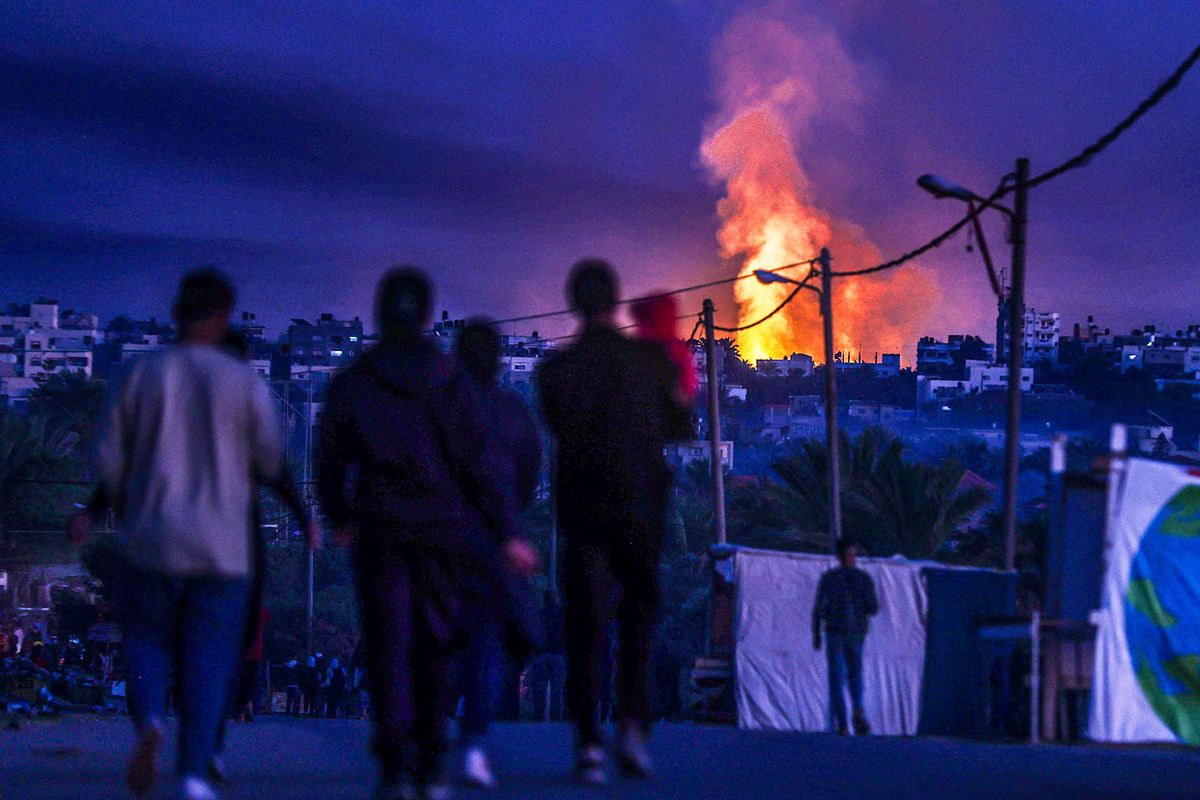As a United Nations agency halted aid deliveries in northern Gaza, where acute malnourishment is rampant among children, citing a "breakdown of social order" fueled by Israel's bombardment of and blockade on the enclave, the United States for a third time on Tuesday vetoed a cease-fire resolution at the U.N. Security Council—saying it was an inopportune time to demand that Israel end its massacre of Palestinians.
U.S. Ambassador to the U.N. Linda Thomas-Greenfield said the cease-fire resolution, proposed by Algeria, would "negatively impact" negotiations for a truce that are ongoing.
Amar Bendjama, Algeria's ambassador to the U.N., said the U.S. ambassador's lone vote against the resolution "implies an endorsement of the brutal violence and collective punishment inflicted upon" Palestinians in Gaza.
Thirteen countries supported the resolution, while the U.K.—which has veto power, like the U.S., China, France, and Russia—abstained from voting.
The vote marked the third time the U.S. has vetoed a cease-fire resolution at the U.N. Security Council (UNSC). Meanwhile, the Biden administration has approved weapons transfers to Israel without the oversight of the U.S. Congress since the assault began in October, and has vehemently defended the bombardment as being focused on defeating Hamas, even as Israel has killed more than 29,000 Palestinians including more than 11,500 children.
"We should ask ourselves: How many innocent lives must be sacrificed before the council deems it necessary to call for a cease-fire?" said Bendjama. "Palestinian lives matter. Each one of us decides where to stand in this tragic chapter of history."
As the U.S. rejected the cease-fire resolution, Al Jazeera reported on the chaos that has erupted in northern Gaza as Israel has blocked aid trucks from reaching starving civilians there.
The World Food Program (WFP) said Tuesday it was pausing deliveries after crowds of desperate people overwhelmed aid workers.
As Al Jazeera reported, children collected flour that spilled from an aid truck in Gaza City, before Israeli forces began firing on the crowd.
"We want to feed our children just like everyone else," one Palestinian man told Al Jazeera, "so we went to get some flour. But then we were shot at, shells were fired, and tanks advanced at us."
The WFP and the U.N. Children's Fund said Monday that starvation is particularly severe in northern Gaza, with 1 in 6 children under age two—more than 15%—acutely malnourished. An estimated 3% of children under two are experiencing a severe form of wasting—being underweight for their age and height.
In December, 15 agencies including the WFP warned that northern Gaza is at risk for a famine by May unless conditions significantly improve.
The United States' veto of Algeria's resolution on Tuesday, said Bendjama, should be understood as "approval of starvation as a means of war against hundreds of thousands of Palestinians."
The U.S. proposed its own resolution calling for a "temporary cease-fire as soon as practicable," and warning Israel not to conduct an expected ground operation in Rafah, where more than 1.5 million people—most of whom have been forcibly displaced from other parts of Gaza—are now sheltering.
The Permanent Mission of Liechtenstein to the U.N. called on the U.N. General Assembly (UNGA) to take action to protect Palestinians.
Under Section A of Resolution 377A of the U.N. Charter, also known as "Uniting for Peace," the UNGA can convene an emergency meeting and make recommendations for collective measures, if members of the UNSC can't reach an agreement and fail to exercise their "primary responsibility for the maintenance of international peace and security."
Hossam Baghat, executive director of the Egyptian Initiative for Personal Rights, suggested the U.S. veto should trigger "mass resignations of U.S. diplomats and public servants from the State Department and across the administration."
Al Jazeera reported that Palestinians in Gaza expressed anger over the United States' latest veto.
"There is a great deal of pessimism and frustration. Palestinians no longer trust the international community, as we have been hearing from locals here in Gaza," correspondent Tareq Abu Azzoum reported from Rafah. "During the Security Council meeting there have been more attacks on the ground here in Gaza. People here are completely frustrated."

Shares